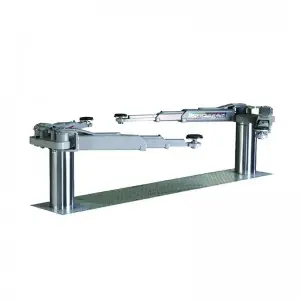In the world of sustainable transport, the rise of new energy vehicles (NEVs) has introduced several advancements that push the boundaries of traditional automotive engineering. Among these innovations, the New Energy Vehicle Battery Lift has emerged as a crucial technology, facilitating the efficient handling, replacement, and maintenance of vehicle batteries. As electric vehicles (EVs) and hybrids become increasingly prevalent, understanding the significance of battery lifts in the maintenance ecosystem becomes vital.
The core of any electric vehicle is its battery pack, which not only powers the vehicle but also serves as a key element in its overall performance and efficiency. Battery packs are typically heavy, often weighing hundreds of pounds, making their installation and removal a labor-intensive process that poses both logistical and safety challenges. The New Energy Vehicle Battery Lift has been designed to mitigate these difficulties, providing automakers, service centers, and vehicle owners with an innovative solution.
One of the primary advantages of utilizing a battery lift is the increased efficiency it introduces to battery replacement. In traditional processes, battery replacement could take hours due to the manual lifting and complex handling required. With a battery lift system, this process is streamlined, allowing technicians to quickly remove and replace battery packs without the risk of injury or damage to the battery and surrounding components. This efficiency not only saves time but also reduces vehicle downtime, ultimately benefiting consumers who rely on their vehicles daily.

Revolutionizing the Automotive Industry: The Role of New Energy Vehicle Battery Lifts in Sustainable Transportation Solutions
Furthermore, the New Energy Vehicle Battery Lift significantly enhances safety standards in vehicle maintenance. Battery packs contain high-voltage components, making improper handling potentially dangerous. The implementation of a battery lift minimizes the risk of accidents that could arise from lifting heavy batteries manually or using inadequate equipment. By promoting safer working conditions, manufacturers and service technicians can focus on their primary responsibilities rather than worrying about injuries or damage to expensive equipment.

Revolutionizing the Automotive Industry: The Role of New Energy Vehicle Battery Lifts in Sustainable Transportation Solutions
Sustainability is at the heart of the new energy vehicle movement. With the growing awareness of environmental issues and the urgent need to reduce carbon footprints, the efficient maintenance of electric vehicle batteries plays a crucial role. Battery lifts support sustainability initiatives by ensuring that battery replacement and recycling are executed properly. They allow for easier access to batteries, enabling efficient recycling processes at the end of their lifecycle. In doing so, they contribute to a more sustainable automotive industry by promoting the recycling and repurposing of battery materials.
The integration of advanced technology into battery lifts is truly revolutionizing how electric vehicles are maintained. Modern battery lifts often come equipped with features such as automated lifting systems, smart controls, and weight sensors that provide real-time feedback on the condition and positioning of batteries. This technological integration ensures that battery handling is not only efficient but also precisely controlled, allowing for a more proactive approach to vehicle maintenance.
Moreover, as the market for new energy vehicles continues to grow, the demand for skilled technicians knowledgeable in electric vehicle maintenance has surged. The New Energy Vehicle Battery Lift serves as a vital tool in training new technicians, offering them hands-on experience with cutting-edge technology. Training programs that incorporate the use of battery lifts can enhance the skills of future professionals in the automotive industry, ensuring they are equipped to handle the challenges of maintaining the next generation of vehicles effectively.

Revolutionizing the Automotive Industry: The Role of New Energy Vehicle Battery Lifts in Sustainable Transportation Solutions
In conclusion, the New Energy Vehicle Battery Lift is proving to be an essential component of the electric vehicle industry. By enhancing efficiency, improving safety, promoting sustainable practices, and incorporating advanced technology, battery lifts are transforming the operations of automotive service providers. As the demand for new energy vehicles continues to rise, investments in battery lift technologies will likely become a standard practice, enabling the automotive industry to meet the challenges of a rapidly changing landscape while ensuring that electric vehicles remain a viable and attractive option for consumers. Through these innovations, the future of sustainable transportation becomes more promising, paving the way for a greener planet.Quick Lift



